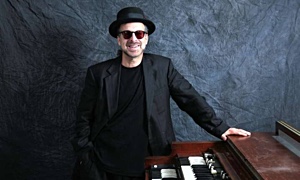Brazilian samba and bossa nova exploded onto the jazz world in the 1960s and soon became a major influence. During this time, guitarist Charlie Byrd and saxophonist Stan Getz gathered together to create a jazz album based around Brazilian rhythms, the 1962 release Jazz Samba. The album hit a gold spot in the American consciousness, and it soon moved up the popular music charts. Getz returned to the bossa nova format in 1964, this time gathering with Joao Gilberto to release Getz/Gilberto. This album soared up the charts, igniting an honest bossa nova craze in the States, winning the 1965 Grammy for Album of the Year, and eventually becoming one of the biggest selling jazz albums of all-time. The world became familiar with bossa nova and samba, making Brazilian rhythms one of the most commonly known styles from the South America or Caribbean.
Despite the wide spread familiarity of Brazilian rhythms, the use of Brazilian genres has long run a close second to the application of Afro-Cuban rhythms in Latin Jazz circles. Most Latin Jazz albums include a reference to Brazilian rhythms at some point, yet their presence is usually overwhelmed by the use of Afro-Cuban rhythms. The danceable nature of Cuban rhythms has played a big part in this - the option to sweat instead of sit has brought many people to the Latin Jazz world. Brazilian music has also been subjected to syrupy string arrangements and a smooth sound over the years, pushing away purists. The close proximity of bossa nova and rock rhythms often leads to a “watering down” effect, once again turning off purists. Brazilian music does have a broad appeal in the listening world, but it has remained second fiddle to Cuban music in the Latin Jazz scene.
A group of smart musicians, deeply educated in Brazilian music, have remained dedicated to the advancement of Brazilian music. Guitarist Romero Lubambo, bassist Nilson Matta, and drummer Duduka Da Fonseca have injected an enthusiastic energy into Brazilian Jazz as Trio da Paz, collaborating with a wide range of jazz musicians such as saxophonist Joe Lovano, vocalist Dianne Reeves, and vibraphonist Joe Locke. Pianist Jovino Santos Neto has drawn upon his years of experience with legendary Hermeto Pascoal to create a distinct approach to Brazilian Jazz that calls upon lesser-known styles such as baião and xote. Flautist Mark Weinstein has expanded his exploration of Latin music to dig deeply into the world of Brazilian Jazz, aided by members of Trio da Paz. Pianist Helio Alves brings a jazz fluency to Brazilian rhythms, bringing an elegant grace and style to the genre. Arranger Gary Morgan has spent years refining his craft, and his skills have propelled his big band, PanAmericana, headfirst into the world of Brazilian Jazz. Harmonica player and vibraphonist Hendrik Muerkens utilizes the unique characteristics of his chosen instruments to sail through the world of Brazilian rhythms with a noticeably personal sound. Each of these artists has pushed the genre forward, bringing it once again to the center of our attention.
Despite the wide spread familiarity of Brazilian rhythms, the use of Brazilian genres has long run a close second to the application of Afro-Cuban rhythms in Latin Jazz circles. Most Latin Jazz albums include a reference to Brazilian rhythms at some point, yet their presence is usually overwhelmed by the use of Afro-Cuban rhythms. The danceable nature of Cuban rhythms has played a big part in this - the option to sweat instead of sit has brought many people to the Latin Jazz world. Brazilian music has also been subjected to syrupy string arrangements and a smooth sound over the years, pushing away purists. The close proximity of bossa nova and rock rhythms often leads to a “watering down” effect, once again turning off purists. Brazilian music does have a broad appeal in the listening world, but it has remained second fiddle to Cuban music in the Latin Jazz scene.
A group of smart musicians, deeply educated in Brazilian music, have remained dedicated to the advancement of Brazilian music. Guitarist Romero Lubambo, bassist Nilson Matta, and drummer Duduka Da Fonseca have injected an enthusiastic energy into Brazilian Jazz as Trio da Paz, collaborating with a wide range of jazz musicians such as saxophonist Joe Lovano, vocalist Dianne Reeves, and vibraphonist Joe Locke. Pianist Jovino Santos Neto has drawn upon his years of experience with legendary Hermeto Pascoal to create a distinct approach to Brazilian Jazz that calls upon lesser-known styles such as baião and xote. Flautist Mark Weinstein has expanded his exploration of Latin music to dig deeply into the world of Brazilian Jazz, aided by members of Trio da Paz. Pianist Helio Alves brings a jazz fluency to Brazilian rhythms, bringing an elegant grace and style to the genre. Arranger Gary Morgan has spent years refining his craft, and his skills have propelled his big band, PanAmericana, headfirst into the world of Brazilian Jazz. Harmonica player and vibraphonist Hendrik Muerkens utilizes the unique characteristics of his chosen instruments to sail through the world of Brazilian rhythms with a noticeably personal sound. Each of these artists has pushed the genre forward, bringing it once again to the center of our attention.
























